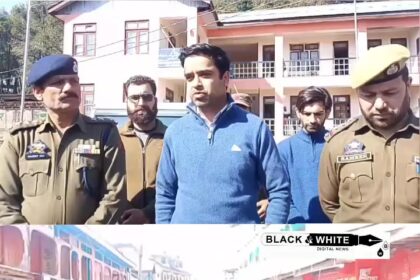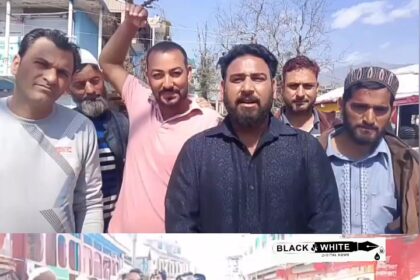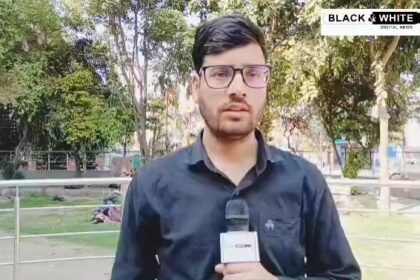||Black and White Digital News||
||December 01,2024 ||
Jammu : The proposed ropeway project for the iconic Mata Vaishno Devi shrine has plunged the region into turmoil, sparking intense protests in Katra and a wave of political interventions. What began as a localized outcry by residents concerned about their livelihoods and the sanctity of the pilgrimage has now evolved into a larger political debate, with major parties like the Congress and the Peoples Democratic Party (PDP) backing the agitating groups.
On Saturday, PDP chief and former Chief Minister Mehbooba Mufti visited Katra to express solidarity with the protesters. Strongly opposing the decision of the Shri Mata Vaishno Devi Shrine Board to construct the ropeway, she demanded the immediate withdrawal of FIRs lodged against two protesters and called for a rethink of the project.
Mehbooba Mufti’s Stand: ‘Development Must Not Marginalize’:
Addressing the media during her visit, Mehbooba Mufti accused the Shrine Board of disregarding the concerns of Katra’s residents, who have served as custodians of the pilgrimage for generations.
“This project is being implemented without consulting the local population, whose livelihoods depend on the traditional pilgrimage routes. The pony owners, porters, shopkeepers, and other stakeholders who form the backbone of the Vaishno Devi pilgrimage are being sidelined,” Mufti said.
She warned against compromising the region’s cultural and spiritual heritage under the guise of development, adding, “Development should uplift the community, not marginalize it. This ropeway, while beneficial for a section of devotees, cannot be justified at the cost of livelihoods and the pilgrimage’s sanctity.”
Concerns of the Protesters:
The proposed ropeway, envisioned to provide faster and safer access to the shrine for elderly and differently-abled devotees, has been met with resistance from local stakeholders. Protesters argue that the project could:
Erode the traditional economy that thrives on foot pilgrimages.
Displace hundreds of families dependent on services such as pony rides, porter jobs, and roadside commerce.
Cause irreversible environmental damage to the region’s fragile ecosystem.
Alter the spiritual experience of devotees who view the journey as integral to their religious practice.
“This is not just a project; it’s a threat to our livelihoods, culture, and heritage. We will not allow the Shrine Board to impose this without addressing our concerns,” said a protest leader.
The Political Context:
Mehbooba Mufti’s visit follows similar support extended by the Congress, which criticized the project earlier this week. Senior Congress leaders visited Katra three days ago, emphasizing that the ropeway would harm the region’s economy and disrupt its socio-cultural fabric.
The backing of these political heavyweights has amplified the voices of the protesters, turning the ropeway controversy into a politically charged issue. “This is not just about Katra; it is about how development projects must prioritize the people most affected by them,” Congress leaders stated.
Shrine Board Defends the Project:
Amid mounting opposition, the Shri Mata Vaishno Devi Shrine Board has defended the ropeway, describing it as a crucial upgrade to the pilgrimage infrastructure. According to the Board:
The project will enhance safety for pilgrims, especially during peak seasons and adverse weather.
It will reduce congestion on traditional routes, improving crowd management.
Environmental concerns have been addressed with compliance to regulatory norms.
“While we understand the concerns of the locals, the ropeway is intended to complement the existing routes, not replace them. It is for the benefit of the devotees,” the Board stated in a press release.
A Balancing Act: Development vs. Sentiment:
The ropeway controversy has sparked a broader debate about balancing development with environmental preservation and local livelihoods. Proponents argue that modernization is essential for handling the growing number of devotees, while critics view the project as an assault on Katra’s traditional economy and heritage.
Protesters Vow to Fight On:
Despite assurances from the Shrine Board, the protests show no signs of abating. “This is not just about development; it is about respect for the people who have kept this pilgrimage alive for centuries. We will fight until our voices are heard and our concerns addressed,” said another protest leader.
The Road Ahead:
As political pressure mounts and protests intensify, the government and the Shrine Board face the challenging task of finding a resolution that satisfies all stakeholders. The controversy highlights the delicate balance required between pursuing progress and respecting the traditions and livelihoods that define the region.
For now, the ropeway remains a flashpoint, raising critical questions about the cost of development in one of India’s most revered pilgrimage destinations.
Baldev Raj Sharma
Leave a comment
You Might Also Like
SDM Gool and SHO Gool Appeal to the Public for Help
SDM Gool and SHO Gool Appeal to the Public for Help #Gool #Ramban #GoolNews #SDMGool #SHOGool #PublicAppeal #RambanNews #JammuKashmirNews #LocalAdministration…
0 Min Read
Protests Erupt in Ramban’s Gool After Body of Young Girl Zahida Found; Locals Demand D£ath Penalty for K!llers
Protests Erupt in Ramban’s Gool After Body of Young Girl Zahida Found; Locals Demand D£ath Penalty for K!llers #Ramban #GoolRamban…
0 Min Read
Iran War D£ath Toll Reaches 1,045, Says Iranian Government Agency — AP Report
Iran War D£ath Toll Reaches 1,045, Says Iranian Government Agency — AP Report #IranWar #IranNews #BreakingNews #WarUpdate #MiddleEastNews #IranConflict #WorldNews…
0 Min Read
Big Opportunity: Indian Army Hiring 800 Porters in Rajouri–Poonch Secto
Big Opportunity: Indian Army Hiring 800 Porters in Rajouri–Poonch Secto #IndianArmy #ArmyRecruitment #IndianArmyJobs #PorterRecruitment #RajouriPoonch #ArmyPorter #JammuKashmir #JobOpportunity #DefenceJobs #IndianArmyPorter…
0 Min Read









